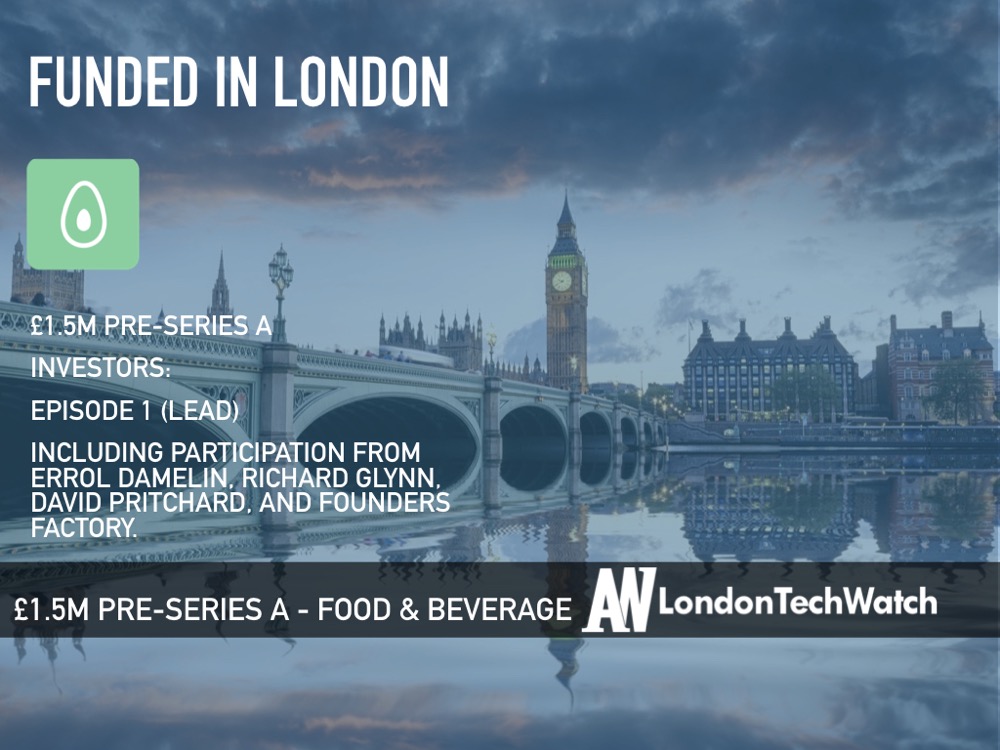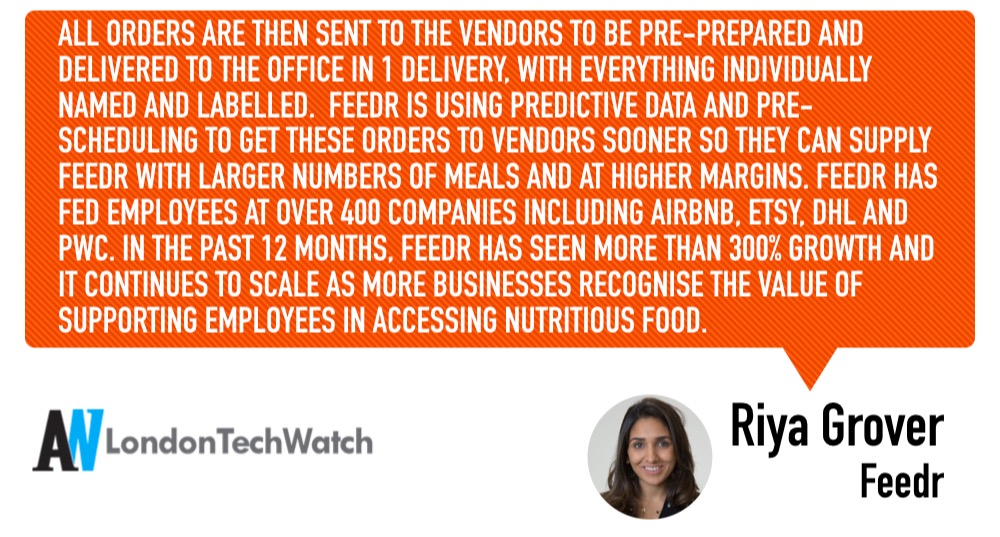How enticing does the phrase “office lunch” sound? Do you think of tasty, healthy food that’s personalised to your liking? Probably not, and that’s why Feedr solves this issue with its online marketplace that connects local vendors with hungry employees in the workplace. Feedr’s Cloud Canteen lunch program features a rotating daily menu from a selection of the best vendors including Farmstand, We Grill, and Potage. Employees will never get bored of their lunch because there are over 100 vendors participating in Feedrs marketplace, and the menu is constantly changing with healthy, personalised food options.
London TechWatch spoke with CEO Riya Grover to learn how Feedr is redefining workplace lunch and its recent funding round.
Who were your investors and how much did you raise?
We have raised a total of £2.1M in funding over 2 rounds. Our latest funding was raised in November and is a pre-Series A funding round. Our round is led by London early-stage VC firm Episode 1, and angel investors that include: Errol Damelin (Wonga founder and renowned fintech investor), Richard Glynn (former Ladbrokes CEO and founder of Alinsky Partners), David Pritchard (founder of OpenTable Europe) and Brent Hoberman’s Founders Factory.
Tell us about the product or service Feedr offers.
Feedr is a smart lunch platform using technology to offer office workers personalised meals from healthy food suppliers. Individuals can choose their own meals through Feedr’s Cloud Canteen lunch program, from rotating daily menus featuring London’s best vendors such as Deliciously Ella, Farmstand, We Grill, Potage, Maple & Fitz and more.
All orders are then sent to the vendors to be pre-prepared and delivered to the office in 1 delivery, with everything individually named and labeled. Feedr is using predictive data and pre-scheduling to get these orders to vendors sooner so they can supply Feedr with larger numbers of meals and at higher margins. Feedr has fed employees at over 400 companies including Airbnb, Etsy, DHL, and PwC. In the past 12 months, Feedr has seen more than 300% growth and it continues to scale as more businesses recognise the value of supporting employees in accessing nutritious food.
What inspired you to start Feedr?
We are inspired to change the way employees are eating in the workplace by making healthy and delicious food options accessible in daily life. We noticed that there have been clear changes in the way consumers want to eat, and yet people and employees are failing to actually eat nutritious, fresh and varied food during their daily lunch break at work. We saw an opportunity to disrupt this space and to make healthier food accessible from our collection of London’s best food vendors.
 What is the biggest difficulty in forming vendor relationships? What about Feedr appeals to vendors?
What is the biggest difficulty in forming vendor relationships? What about Feedr appeals to vendors?
We have a fantastic community of over 100 vendors who all have a mission to give people access to better, exciting and healthy food. Because we all share this principal and ultimate vision, it’s never hard to build relationships with them. Our vendors are happy to work with us as it opens up an otherwise tricky demographic to reach. Many of our vendors don’t have the resources to branch out into corporate sales, so our platform gives them access to this huge local market. We also work very closely with our vendors to ensure we’re offering our customers the best possible service and product. Having served thousands of meals since our inception, we see customer feedback as vital to improving ours and our vendors’ proposition – so we provide that feedback loop for our vendors, and we work with them on menu creation, meal design, pricing and more.
How is Feedr different?
Feedr differs in that most of this market is usually targeted offline, and we saw an opportunity here to work in the online space as it gives us the ability to utilise tech to drive personalisation in new ways. Employees can order their own meal from a selection of different vendors which changes everyday, then everything arrives collectively – creating a system which offers personalisation on a large scale.
We also utilise our customers’ order data to inform menu selections moving forward: much like Netflix offers recommendations based on previous watching behaviour. This means the more you use Feedr, the more personalised your experience at a company and individual level.
We also utilise our customers’ order data to inform menu selections moving forward: much like Netflix offers recommendations based on previous watching behaviour. This means the more you use Feedr, the more personalised your experience at a company and individual level.
What market are you targeting and how big is it?
We cater to the workplace – 75% of people are in employment in the UK and there are over 1.1M companies based in London alone. Employees themselves purchase and eat over 500M meals a year whilst at work, so the potential for growth is huge. Having created a service that is totally flexible with multiple subsidy options from as little as £8/week per employee, we offer companies bespoke packages which can scale with a company’s size, needs and budget. This means we’re able to offer something for any company looking to provide or partially subsidize healthier food for their workers, whether that’s a monthly team lunch or a fully subsidised daily lunch programme. We have seen food systems being transformed, with the rise of on-demand players in the B2C space, yet few companies are offering fresh meals for the workplace at scale, as Feedr is.
What’s your business model?
We have a totally unique business model, which distinguishes us from others in the market in three ways:
- We have a curated community of vendors – we work with only the best to ensure every meal on our platform meets our set of strict standards. We pride ourselves on working with London’s best vendors who champion sustainable practices whilst creating delicious, well balanced and healthy meals.
- We offer a scalable but personalised service – we offer a personalised service but use a smart operations model to manage food production and delivery on a large scale. We bulk deliveries for maximum efficiency and limited environmental impact.
- We have an efficient + competitive pricing model – working on a large scale, the pre-order model allows vendors to minimise waste and reduce production costs. This, in turn, allows us to pass the savings back to the customer, with zero price markups and no delivery fees. As we continue to scale, these cost savings will increase, meaning we’re able to drive down prices even further – making it even cheaper for employees to access fresh, healthy food in the office.
What was the funding process like?
For many entrepreneurs, you have to kiss lots of frogs to find a prince. This was certainly the case for us; it’s a process that you have to invest time in and build a structure around. The silver lining was that telling our story repeatedly and facing many (harsh) rejections really helped us to hone our objectives, make our positioning clearer and address real challenges in the business.
For many entrepreneurs, you have to kiss lots of frogs to find a prince. This was certainly the case for us; it’s a process that you have to invest time in and build a structure around. The silver lining was that telling our story repeatedly and facing many (harsh) rejections really helped us to hone our objectives, make our positioning clearer and address real challenges in the business.
We were definitely much stronger at fundraising by the end of the process compared to the start and we came out with clearer ideas and questions than we went into it with.
What are the biggest challenges that you faced while raising capital?
In order to find the right investors who have the correct risk appetite, interest in your space, and inclination to invest, you somewhat have to play a numbers game. This takes considerable time, which is time away from growing and managing the business- juggling fundraising and regular CEO activities is definitely a challenge.
Another personal challenge was figuring out what advice to take and to what extent. People have varying opinions many of which are based on different rich and relevant experiences. You have to become very discerning about which pieces to take versus following your gut to build or create something that others can’t yet envisage.
What factors about your business led your investors to write the cheque
Investors were impressed by our plans to use machine learning and unique algorithms to power predictive technology. Feedr has seen more than 300% growth in the last 12 months and it continues to scale as more people recognise the value of eating well daily. At Feedr, we sit at the intersection of 3 key trends – food delivery, employee well-being and the way consumers are becoming more accustomed to choice and health in their food. Our ability to cater to everyone is also a pulling point, as with the cloud canteen, there’s no minimum order and you can all order from different vendors, so our aim is to encourage people to come together over lunch, but this means that everyone is happy with their own choice of food!
What are the milestones you plan to achieve in the next six months?
Our plans to grow the business over the next six months include growing our internal team. We aim to work with a creative and trustworthy team who are innovative and able to adapt to changing trends in the food sphere. We plan to work consistently off customer insights and feedback to constantly improve Feedr, whilst using technology to compile our data in order to scale our menu building and recommendations.
What advice can you offer companies in London that do not have a fresh injection of capital in the bank?
A lean mentality can sometimes be the best thing at the beginning. If you don’t have a lot of funding, don’t let that stop you from pursuing your idea and be creative in ways to prove there’s a real demand or need for your product. You can run really smart experiments with very little capital and do a lot of research on the space, competitive landscape etc. Once you know what you’re doing, the money will follow.
Where do you see the company going now over the near term?
We see big things for Feedr. We plan to expand Feedr into other parts of the UK and in other European cities. We will expand the choice of meals we offer, continue to build out our machine learning driven personalization, and also provide more valuable nutritional advice through our product.
What’s your favorite tourist destination in London?
Nothing like ice skating at Somerset House as Christmas approaches.





